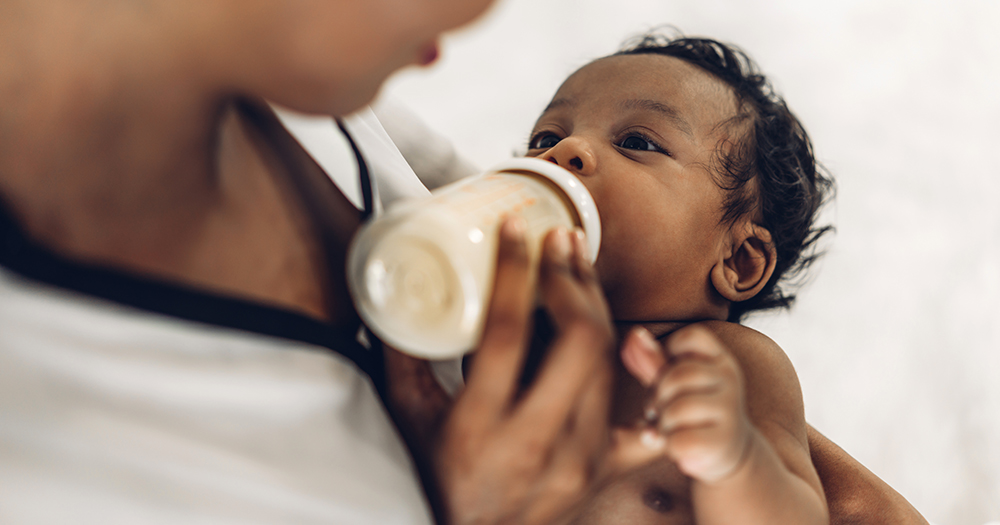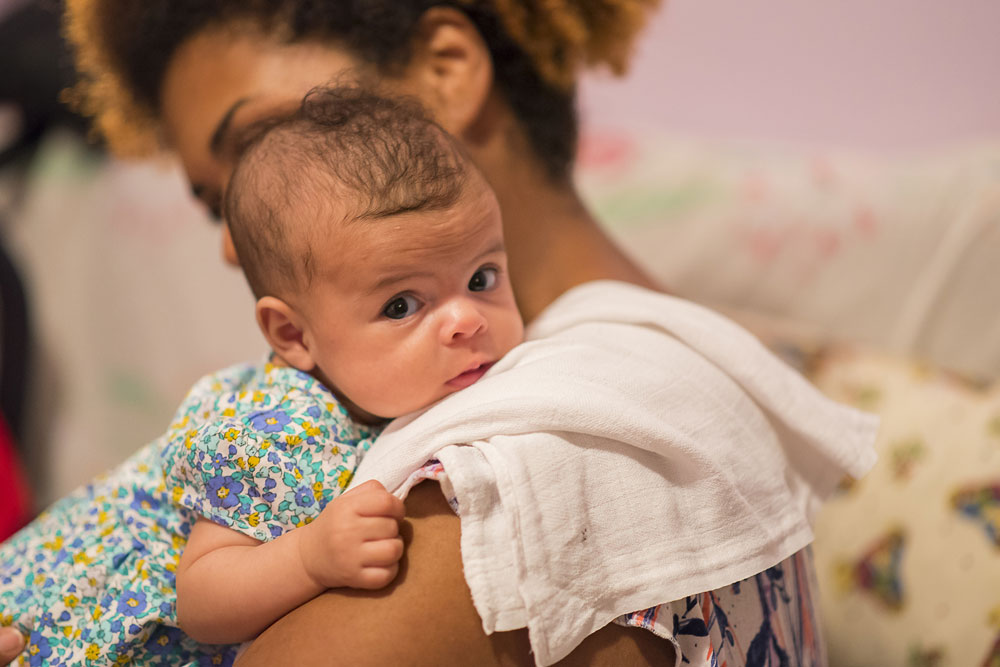Fighting the Formula-Feeding Stigma: The Pressures of “Breast is Best”

In this frank Q&A, Suzanne Barston, author of “BOTTLED UP: How The Way We Feed Babies Has Come to Define Motherhood, And Why It Shouldn’t” (University of California Press) and creator of the website Fearless Formula Feeder, shares her insight on the stigma that can surround formula-feeding moms.
Q: Breastfeeding advocates have been fighting to counteract what they dub a “formula-feeding culture.” If bottle feeding is so prevalent, why do you think mothers who don’t breastfeed feel alienated or guilty for their feeding choices?
It all depends on your definition of “culture.” There’s no doubt that bottles are still used as representative imagery for all things baby (although I would argue that this is because so many of us are working mothers, for whom bottles are a necessary tool—they get filled with pumped breast milk as well as formula), and a visit to most shopping malls in America will provide plenty of opportunity to see formula feeding in action. But cultural influences also include the smaller subcultures we live in. For example, in many urban, upper-middle-class parenting circles, breastfeeding is not only accepted, it is assumed. So if a mother is formula feeding, she will feel like the odd woman out. It’s actually quite similar to being a breastfeeding mom in a predominately bottle-feeding area of the country—whenever you’re doing something that is challenging moral or social norms, you’re going to feel a sense of judgment.
Pop culture informs our social norms in the aspirational sense, and nearly every celebrity who has given birth in the past year has spoken openly about breastfeeding (usually as a reason why they lost baby weight at such an astronomical rate—never mentioning the team of personal trainers and private chefs who may have assisted in the process). You might not have seen your mother breastfeed, or your older sisters, but if Alanis, Pink, and the Kardashians are doing it, it at least has a coolness factor that bottle feeding doesn’t.
And then, of course, you have the three horsemen of the parenting apocalypse: physicians, parenting experts, and the internet. Parents are heavily influenced by these forces, and when organizations like the AAP and the federal government are telling us that breastfeeding saves millions of dollars and hundreds of innocent lives every year, I think that has greater impact on a new mom’s psyche than seeing a baby doll that happens to come with a bottle.
Q: The American Academy of Pediatrics and several government public health agencies have urged hospitals to adopt the Baby Friendly Hospital Initiative in order to increase breastfeeding rates. What are your thoughts on this program?
I consider myself a breastfeeding advocate—I think women should be encouraged to breastfeed, and supported at every turn. But that doesn’t mean they should be bullied or scared into it, and I do not find the BFHI supportive in the way its creators defend it to be. What I like about the initiative is that it stops medical staff from interfering in the processes of bonding and breastfeeding—which I don’t believe to be mutually exclusive. Breastfeeding advocates have argued that many doctors and nurses sabotage breastfeeding by supplementing too soon, or separating mother from child for unnecessary reasons, and if the initiative was simply putting a stop to this trend I’d be all for it because that would be giving more autonomy to parents in the birthing and postpartum process. Instead, the BFHI is taking that autonomy away. It is forbidding the use of formula supplementation unless there is a medical reason to do so; making parents essentially beg for formula if they feel it is necessary for any number of personal reasons. I feel strongly that there does need to be reform in how hospital birthing is carried out, but the BFHI isn’t the answer. Babies are already getting great care in most hospitals, but mothers are not. And when you release a new mom after two days of harassing her and making her feel stressed out and physically uncomfortable, you’re setting her up not only for a rougher emotional and physical recovery, but also potentially for breastfeeding failure. There’s no reason why the BFHI couldn’t incorporate policies that encourage and support breastfeeding without taking the option away from parents who want to formula feed. And if it can’t, then I’d prefer the advocates of this initiative not insist how much it serves women. My readers who have experienced baby-friendly hospitals usually call them “mother-unfriendly.” One woman, a rape victim who had decided not to nurse because it brought up painful memories of her trauma, was given so much resistance at her baby-friendly hospital about not breastfeeding that she had to divulge her true reasons for making it, forcing her to relive her darkest memory at a time that should’ve been filled with joy. And that’s just the tip of the iceberg.
When the hosts of ABC’s The View spoke out against the BFHI, they were accused of being anti-breastfeeding. Disliking the policies set forth by the BFHI is not being anti-breastfeeding, it’s about being pro-parental rights. It’s fine to fight for a movement to increase breastfeeding initiation rates, but let’s not pretend that the BFHI is meant to help women. It’s meant to help women who want to breastfeed, and who don’t have too much trouble doing so.
Q: In your book, you argue that the real barriers to breastfeeding are not what activists believe them to be. Why do you think so many women initiate breastfeeding but fall short of the American Academy of Pediatrics and World Health Organization recommendations to breastfeed for at least a year?
I think it will be very interesting to watch what happens to our breastfeeding rates now that the BFHI is becoming more widespread. There’s consensus that the barriers to breastfeeding are mostly social—the result of living in a bottle-friendly society; and logistical—i.e., medical professionals giving poor advice for common breastfeeding problems. There’s a lot of buzz about “beating the booby traps,” and yet so many breastfeeding advocates are completely unwilling to believe that more than a tiny subset of women are physically unable to nurse. The figure that gets tossed around is 1 to 5%, but even if this is true—and I believe the figure to be significantly higher—that still means that out of 10,000 women, as many as 500 of them will be unable to successfully nurse their children. And this statistic is only accounting for those with a physiological inability to produce milk. There are also babies who have extreme difficulty nursing due to oral abnormalities or other disorders; and mothers who have intense physical pain while breastfeeding, or a condition called D-MER, which causes severe feelings of depression or anguish at every nursing session. This number doesn’t include women who are survivors of sexual trauma or women with certain medical conditions necessitating drugs incompatible with breastfeeding. Plus, our breastfeeding initiation rates are not that shabby—about three-fourths of us leave the hospital as nursing mothers—but the rates drop off after 3 months and 6 months postpartum. This correlates to the end of the typical maternity leave. Laws which require employers to accommodate pumping moms help, but some women still find it difficult to keep up with a baby’s needs, especially when they work long hours or have certain types of jobs which do not lend themselves well to pumping schedules. Many women do succeed with combining work and exclusive breastfeeding, but there are large numbers who simply can’t make it work without incorporating a bit of formula here and there.
In the three years I’ve been receiving stories from women about why they ended up formula feeding, I can count on my hands how many have cited the stereotypical “booby traps” as reasons for ceasing to breastfeed. As long as we refuse to listen to the women who wanted to breastfeed but couldn’t, I don’t think we are going to see a dramatic rise in long-term, exclusive breastfeeding.
Q: Why do you think the pressure to breastfeed has created a dangerous atmosphere for both mothers and babies?
Parents e-mail me every day with panicked questions about formula feeding—everything from proper formula handling and preparation, to whether they need to boil the water first, to concerns about food intolerances or reactions to certain formulas. This doesn’t surprise me—none of my prenatal classes or books discussed formula feeding, except to compare it unfavorably to breastfeeding. Since our breastfeeding rates are what they are, we need to be realistic about the fact that the majority of babies will be receiving some formula in their first year. So why aren’t we educating new parents on formula safety? When I stopped breastfeeding my son, the only place offering substantial info on formula was the formula company websites themselves. Parents shouldn’t have to turn to a profit-driven corporation for what is essentially medical advice. Doctors need to be able to answer parents’ questions about formula without being dismissive—I’ve heard many pediatricians saying “all formulas are the same,” and this is an outright fallacy; formula comes in many different forms, and they do vary in some important ways. One of my fears about the BFHI, and breastfeeding advocacy in general, is that parents will be too ashamed to ask for advice on formula feeding. A sleep-deprived and guilt-ridden first-time mom is not in any condition to read through World Health Organization guidelines on proper formula handling—probably a good thing, as it will unnecessarily scare the heck out of her.
Q: Are you anti-breastfeeding?
I advocate for breastfeeding wherever and whenever I can; I think it can be one of the most incredible, self-affirming acts a new mother can do. There are a few women who’ve been reading my blog since they stopped breastfeeding their first children, and who are now breastfeeding subsequent kids. This makes me so incredibly proud and happy, because I feel like I have done my job. Women need to be encouraged no matter what feeding method they choose. They deserve respect, and the gift of unbiased, non-rhetorical information.
Breastfeeding advocates have said that extolling the benefits of breastfeeding didn’t work to convince women to breastfeed, and this is what led to the vilifying of formula as an alternative. I think we’ve skipped a step. Why don’t we try addressing the real barriers to breastfeeding first, and then try promoting it positively, rather than moving to such a negative approach? Talking about the dangers of not breastfeeding puts women in a negative headspace about everything, and puts intense pressure on new parents—a group that is already embarrassingly unsupported and being overloaded with inordinate expectations. I’d suggest that we tell new mothers how gratifying breastfeeding can be, and help them navigate the roadblocks without being absolutist or anti-formula. I’ve heard from so many successful second-time breastfeeding moms that not having a fear of formula—knowing that their first child thrived, and that it would be OK if breastfeeding didn’t work the second time around, either—made all the difference.

Q: With every major medical association and government agency supporting the assertion that formula feeding leads to major health risks, why do you insist that formula feeding should still be considered a viable option for new parents?
I’m not going to argue with the assertion that nutritionally, breastmilk is superior to formula. But parenting is like a big bag of Halloween candy. Sometimes you get a few boxes of raisins, and it’s disappointing, but then you realize there are still enough chocolate bars and gummy bears to make up for it. We don’t feed babies in a vacuum, and if breastfeeding is causing a baby to lose too much weight because mom doesn’t have the milk supply, or breastfeeding is preventing mom from taking medications that she needs for her health, or making her feel desperate and out of control, I would much rather she choose formula and be able to parent in the best way she can. Breastmilk is wonderful, but it is one part of a much larger puzzle that leads to happy, healthy children.
Like Joan Wolf and Hannah Rosin before me, I do question the body of breastfeeding research, and worry that we are confusing correlation with causation. There’s been tremendous discourse on why breastfeeding benefits are overblown, but in the end, I think it’s somewhat of a moot point. Even if we have proven without the benefit of a doubt that breastfeeding trumps formula feeding, our response should not be to force every unwilling mother to nurse her young. Instead, we could be making milk banks more readily accessible, or better yet, improving formula. For the record, I do believe that formula feeding is a perfectly safe option (both my kids were formula fed for a large part of their infancy). But why aren’t those that feel it isn’t a safe option demanding better options for women who cannot, or chose not to breastfeed? Wouldn’t that be in the best interest of both babies and mothers?
Q: You run a blog that publishes stories of breastfeeding “failure” and the reasons women formula feed. What do you think breastfeeding advocates could learn from reading these accounts?
Originally I hoped that by publishing the stories these brave women have shared with me, I could provoke real change in the breastfeeding advocacy world. We have had a few lactation professionals stop by and tell us that the stories have inspired them to approach clients with greater sympathy and understanding, and that is wonderful. Lately, though, I’ve seen a few well-known online breastfeeding advocates referring to our stories as “excuses,” or worse yet, as dangerous mythology that will discourage mothers from breastfeeding. So, I’ve sort of given up hope that the stories will impact those who insist that pressuring women is the only way to encourage breastfeeding. What my goal is now, is to provide a safe space for women to express what they have been through. I don’t want anyone feeling as isolated and ashamed as I did when I felt I had failed to nourish my son the “right” way. The community that has sprung up around this weekly feature has been incredible, and watching the women who participate grow stronger and more confident in their choices (or lack thereof) neutralizes any vitriol that comes our way.
Q: Why has the breast versus bottle debate become so polarizing?
I asked myself this question while writing the book, and I still don’t have a good answer. I think a lot plays into this debate: cultural factors, socioeconomic prejudices, racism, sexism. Sometimes I think it’s a direct result of what liberal feminism achieved in the past few decades, and at other times, I’m tempted to blame a few select parenting experts for fueling the fire. But I think the breast/bottle issue is in many ways more complex than the stay-at-home versus working mother battle, because it revolves around breasts. Breasts serve a dual purpose in our society—they are functional, but they are also sexual. Some have argued that we need to de-sexualize the breast, and while I agree that might solve the very real problem of women being harassed for breastfeeding in public, I don’t think it’s fair or realistic. It is not our place to tell a woman what a body part should mean to her. Some women may have extremely powerful associations with their breasts as sexual objects, and some may have had the ability to choose in this regard ripped away from them; even if a woman wants to see her breasts as functional, past sexual abuse might make that an impossibility. Further, breastfeeding is a physical act, meaning that we are reliant on our bodies to cooperate with our desire to nurse. This can be difficult in a world where we’ve become increasingly disconnected from our physical selves, and where environmental threats affect how our bodies operate. There are just so many factors that complicate the discourse, and unfortunately it gets oversimplified into “good mommy/bad mommy.”
Q: What impact has the popularity of the internet had on the infant feeding discourse?
Many women tell me that the only place they were confronted with real animosity towards formula feeding was in online chat rooms or Facebook. It’s easy to brush this off, because who cares what random strangers on the internet think about you?
What we’re forgetting is that for many new parents, the internet is the only source of community, the only real social outlet. So many of us live far away from family, and may not have local support systems intact to help us through the tough first months of parenthood. Instead, we turn to Facebook groups and online forums like BabyCenter and The Bump, attempting to find our “tribe” via a keyboard and WiFi connection.
Additionally, most parents in my generation rely more on Google than their OBGYNs or pediatricians—especially in the case of breastfeeding and birth, where we’ve been warned that the medical community is at best ignorant, and at worst, perpetuators of unnecessary C-sections and mandatory formula feeding. Thus, the internet becomes a breastfeeding mom’s best go-to for support and advice. While some of the breastfeeding sites can be incredible resources, no one can diagnose real breastfeeding problems by reading someone’s frantic midnight forum posting. Worse, many official-sounding advocacy sites spread misinformation that tends to be repeated as fact.
I don’t buy the argument that what is said online is any less powerful than what is said to someone’s face. Social media is still social, and we are social animals. There’s so much talk about the dangers kids face on the web, and yet no one will acknowledge that parents are easy prey for a different type of online predator—the type desperately trying to justify his or her own parenting by diminishing others’.
Q: If the current state of breastfeeding promotion is causing such damage, what are your suggestions for improving breastfeeding rates?
It’s difficult to discuss this without getting into uncomfortable territory because infant feeding has very different meanings and applications depending on socioeconomic status. And it’s for that very reason, I think, that breastfeeding advocacy is missing the mark. The parents who are heeding the warnings about formula feeding are the same folks who are able to take time off work, who have access to good medical care, and who are typically doing whatever it takes to raise healthy babies. These are the same parents who will incur the smallest risks with formula feeding, for a long list of reasons that were outlined by the scholar Joan Wolf in her book, “Is Breast Best.” I argue that these same parents are experiencing the greatest backlash if they cannot or do not breastfeed. So what exactly are we trying to do, here? Without a doubt, these parents have heard the ominous warnings; when they fail to meet breastfeeding recommendations, they feel tremendously guilty, sad, and/or angry. To me, this means that the message has been heard, loud and clear because these emotions come out of fear and the desire to do the best for your kids. I think it’s rather obvious that the scare tactics aren’t helping anyone breastfeed, and instead, they are causing a sort of breastfeeding backlash, or rather a breastfeeding pressure backlash.
I believe we should focus our efforts on the women who want to breastfeed, for however long; use our time, energy and resources to provide free in-home lactation counseling, better research into common breastfeeding problems, and support for working moms. I’d also encourage care providers and peer counselors to stop seeing formula as the enemy, because women who want to combo feed (breastfeeding with formula supplementation) are often discouraged from doing so by lactation professionals, and end up exclusively formula feeding as a result. This is a real shame, because these women probably could have enjoyed the breastfeeding relationship they craved had they been given permission and assistance combining infant feeding methods in a way that worked for their individual circumstances. And it’s also counterproductive from an advocacy standpoint: if the end goal is to have a more breastfeeding-friendly culture, isn’t having a woman happily breastfeeding part-time a positive outcome?







